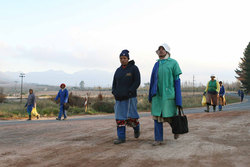
Business Day | 2011/06/08
Land Minister Nkwinti proposes "precarious tenure" policy rather than outright prevention of foreigners from owning SA land
WYNDHAM HARTLEY and HOPEWELL RADEBE
The government is soldiering on with plans to restrict foreign land ownership in SA and to prescribe conditions for land use, Rural Development and Land Reform Minister Gugile Nkwinti said yesterday.
Rather than preventing foreigners from owning land, a policy on "precarious tenure" for land ownership by foreign nationals would be developed "to determine the basis on which foreigners can lease or utilise land", he said.
Tabling his budget vote in Parliament , Mr Nkwinti said the Land Protection Bill would be submitted to the Cabinet this year.
President Jacob Zuma announced in January the state was reviving its controversial plan to limit foreign land ownership. This initiative stalled after a government probe in 2006 found only about 5% of land in SA was foreign owned.
Deputy Rural Development and Land Reform Minister Thembelani Nxesi told Parliament yesterday the government wanted to "guard against the danger that South African prime land — relatively cheap by international standards — will be snapped up by foreign buyers", which would push up land prices. "We need to make it very clear that these measures are in no way motivated by anti-foreigner sentiment," he said.
Instead, the government planned to encourage foreign investment in land in a manner consistent with "national interests".
Mr Nxesi said the policy would endeavour to thwart "undesirable" land use practices such as prime agricultural land being "converted into game farms and golf estates", as was happening in parts of the Western Cape and Eastern Cape.
He warned those in the real estate industry who rejected any form of regulation which reduced their profits that they would not prevail. He said Australia had introduced legislation seeking to control foreign purchases of real estate, while encouraging investment in building new housing, thus benefiting its building industry.
The South African Property Owners Association (Sapoa) said yesterday that while it was sensitive to the need to redress past injustices in the property market, the future performance of the economy was connected to the country’s ability to attract foreign direct investment.
Sapoa CEO Neil Gopal called for a predictable and nondiscriminatory regulatory environment for foreign and domestic enterprises, and regulations that were in accordance with international law.
Mr Gopal said an absence of undue administrative impediments to business, including an impartial system of courts and law enforcement, would be ideal for SA.
A three-tier system of land tenure that sought to restrict foreign land ownership and also suggested limited freehold for South Africans was proposed last year as in a green paper on revising policy for land reform and rural development.
The resultant furore caused Mr Nkwinti to separate land reform from rural development and to produce two green papers. He said yesterday that both green papers were ready to go to the Cabinet.
Mr Nkwinti also told Parliament that R1,3bn had been allocated "for making all land reform farms fully functional and 100% productive" through his department’s recapitalisation and development programme. "This should cover an additional 387 farms, and revitalise 27 irrigation schemes, which have already been identified across the country," he said.
Mr Nkwinti was sharply criticised by Democratic Alliance MP Lindiwe Mazibuko, who pointed out his admission that 90% of land reform farms were failing.
Mr Nkwinti also indicated that the other controversial element of the land reform review — drafting legislation to protect the rights of farm dwellers and farm workers — was also still on track.
"The Land Tenure Security Bill 2010 seeks to promote and protect the relative rights of persons working and residing on farms, as well as those of farm owners," he said.
Public comment on the bill had been collected and it would soon be tabled in Parliament, Mr Nkwinti said. Additional reporting by Thabang Mokopanele













